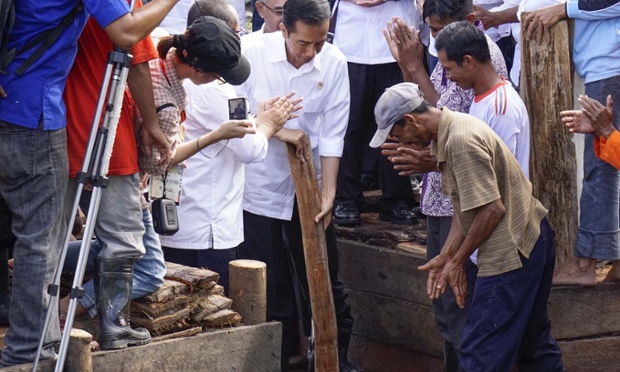Joko Widodo signalled the significant change of direction for Indonesia when he joined a local community in Sumatra in damming a canal designed to drain a peat forest. Halting the draining and burning of peatland will also tackle the forest fires which have trebled since 2011 and can pump smoke across the entire region.
Indonesia suffers more deforestation than any other country, including Congo and Brazil where new data shows deforestation is dropping. One study estimated 80% of the deforestation in Indonesia was illegal, with most of it being cleared for palm oil and timber plantations.
During his visit to Sungai Tohor village, in Riau province, Widodo announced a review of plantation company operations: “If they are indeed destroying the ecosystem because of their monoculture plantations, they will have to be terminated. It must be stopped, we mustn’t allow our tropical rainforest to disappear because of monoculture plantations like oil palm.”
Widodo also said he would strengthen legal protection for peatlands, which store massive amounts of carbon and rarely burn if left undisturbed.
“Peatlands can’t be underestimated, they must be protected because they constitute a special ecosystem,” he said. “This [drainage] canal dam is very good and must be made permanent. What’s best is for peatland to be given to the community to be managed for sago [palm starch similar to tapioca]. Community management is usually environmentally friendly, but if it’s given to companies it is turned into monocultures like acacia and oil palm.”
Greenpeace welcomed the move and said it hoped it would lead to better forest and peatland protection in Indonesia, where the campaign group said existing laws are “weak and poorly enforced”.
“Indonesia’s new president has wasted no time stepping into an international leadership role, well timed to position his country ahead of next week’s UN climate negotiations in Lima, Peru,” said Kumi Naidoo, Greenpeace’s international executive director.


